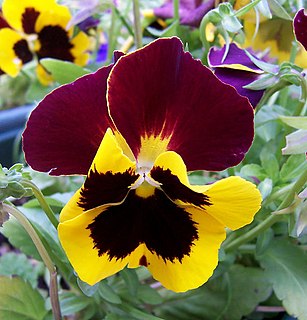
The garden pansy is a type of large-flowered hybrid plant cultivated as a garden flower. It is derived by hybridization from several species in the section Melanium of the genus Viola, particularly Viola tricolor, a wildflower of Europe and western Asia known as heartsease. Some of these hybrids are referred to as Viola × wittrockiana Gams ex Nauenb. & Buttler. For simplicity, the older name Viola tricolor var. hortensis is often used.
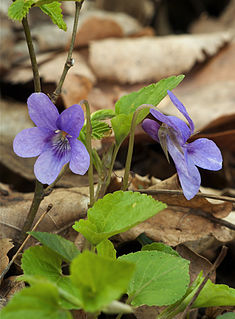
Viola is a genus of flowering plants in the violet family Violaceae. It is the largest genus in the family, containing between 525 and 600 species. Most species are found in the temperate Northern Hemisphere; however, some are also found in widely divergent areas such as Hawaii, Australasia, and the Andes.
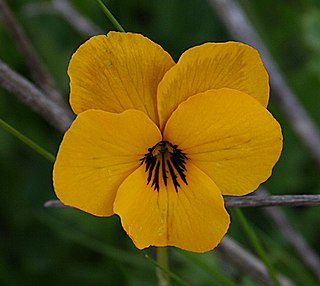
Viola pedunculata, the California golden violet, Johnny jump up, or yellow pansy, is a perennial yellow wildflower of the coast and coastal ranges in California and northwestern Baja California. The common name "Johnny jump up" is usually associated with Viola tricolor however, the introduced garden annual.

The great spangled fritillary is a North American butterfly of the family Nymphalidae.
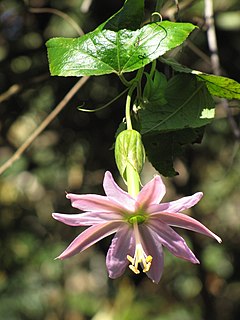
Passiflora tarminiana is a species of passionfruit. The yellow fruits are edible and their resemblance to small, straight bananas has given it the name banana passionfruit in some countries. It is native to the uplands of tropical South America and is now cultivated in many countries. In Hawaii and New Zealand it is now considered an invasive species. It was given the name banana passionfruit in New Zealand, where passionfruit are also prevalent. In Hawaii, it is called banana poka. In its Latin American homeland, it is known as curuba, curuba de Castilla, or curuba sabanera blanca (Colombia); taxo, tacso, tagso, tauso (Ecuador); parcha, taxo (Venezuela), tumbo or curuba (Bolivia); tacso, tumbo, tumbo del norte, trompos, tintin or purpur (Peru).

Viola lutea, also known as the mountain pansy, is a species of violet that grows in Europe, from the British Isles to the Balkans.

Viola canadensis is more commonly known as Canadian white violet, Canada violet, tall white violet, or white violet. It is widespread across much of Canada and the United States, from Alaska to Newfoundland, south as far as Georgia and Arizona.

Viola sororia, known commonly as the common blue violet, is a short-stemmed herbaceous perennial plant that is native to eastern North America. It is known by a number of common names, including common meadow violet, purple violet, woolly blue violet, hooded violet, and wood violet. Its cultivar 'Albiflora' has gained the Royal Horticultural Society's Award of Garden Merit.

Viola beckwithii, known commonly as the Great Basin violet, Beckwith's violet, and sagebrush pansy, is a species of violet native to the western United States. It is an early-flowering plant of sagebrush habitats in the Great Basin region.

Viola purpurea is a species of violet which bears yellow flowers. It is known commonly as the goosefoot violet. It is a small plant which bears thick to fleshy toothed or ridged oval leaves which are mostly green but may have a purplish tint to them. The flowers are made up of bright yellow petals, the lowermost being streaked or veined with purple and the lateral petals with purplish undersides.
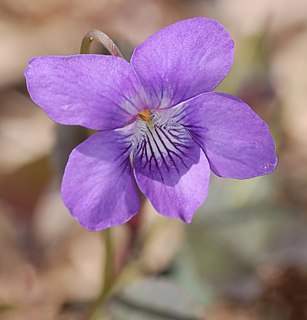
Viola labradorica, commonly known as alpine violet, American dog violet, dog violet, and Labrador violet, is a perennial. It is native to Greenland, eastern Canada, and the eastern United States. The plant sold as Viola labradorica by nurseries is Viola riviniana.

Viola betonicifolia, commonly known as the arrowhead violet, showy violet or mountain violet, is a small perennial of the genus Viola, which contains pansies and violets. It occurs from India and Pakistan in southern Asia throughout eastern Australia and Tasmania. It grows in shaded habitat in forests.
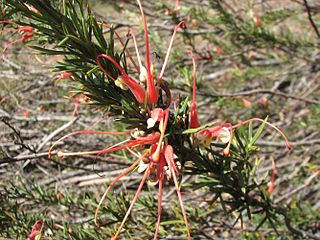
Grevillea tripartita is a shrub in the family Proteaceae. It is endemic to Western Australia, occurring in proximity to the south coast between the east of the Stirling Range and Point Culver.
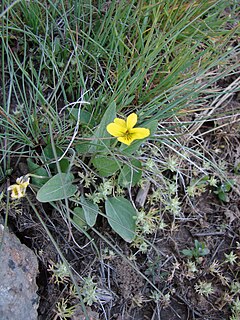
Viola nuttallii is a perennial herbaceous plant in the violet family (Violaceae), and is one of the few violet species with lanceolate leaves. It is native to the western Canada and the north-central and western United States.

Viola vallicola, the sagebrush violet, yellow sagebrush violet or valley violet, is a perennial plant in the Violet family (Violaceae). It is native to Western and Central North America.

Viola bakeri is a species of violet known by the common name Baker's violet. It is native to the Western United States, from Washington and Oregon, to the mountains of northern Nevada, and in California to the southern High Sierra Nevada.

Viola praemorsa is a species of violet known by the common names canary violet, Astoria violet, and yellow montane violet.
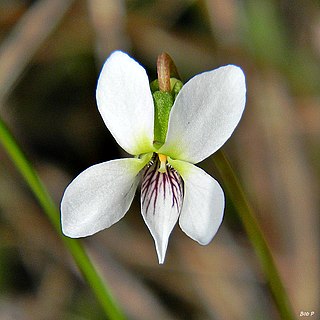
Viola lanceolata, commonly known as lance-leaved violet or bog white violet, is a small group of stemless white-flowered violets. It is an ornamental plant in the Violaceae family, part of the genus Viola. It gets its name from its lanceolate leaf shape and from the habitats in which it thrives.


















